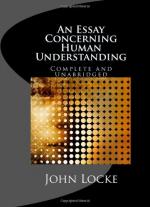
|
| Name: _________________________ | Period: ___________________ |
This test consists of 5 multiple choice questions, 5 short answer questions, and 10 short essay questions.
Multiple Choice Questions
1. What does Locke say words refer to?
(a) Inner ideas.
(b) Experiences of pleasure and pain.
(c) Plants and animals.
(d) Things in the world.
2. How does Locke define truth in an idea?
(a) Proof can be shown mathematically.
(b) Educated people can see the truth.
(c) The truth is self-evident.
(d) An idea corresponds to the world.
3. Why does Locke say we cannot have an innate morality?
(a) Because innate ideas are impossible.
(b) Because he demonstrates that morality is not instinctual.
(c) Because there is no room in the genes.
(d) Because instincts are not moral.
4. What consequence does Locke describe if there were individual words for each thing?
(a) Politics would be chaotic.
(b) Knowledge would be impeded.
(c) Trade would be impossible.
(d) Economies would remain simple.
5. What would happen if words referred to particular things, in Locke's opinion?
(a) No one would understand each other's vocabulary.
(b) Everyone would need to be an even larger language for classes of things.
(c) No one would know that classes of things existed.
(d) There would have to be a word for each thing.
Short Answer Questions
1. What is the philosopher's most important job, according to Locke?
2. What is the consequence of using words to refer to personal ideas, according to Locke?
3. Who is guilty of reification, according to Locke?
4. What does Locke say we about words that cannot be defined any further?
5. Where does Locke say our ideas of morality come from?
Short Essay Questions
1. How does Locke resolve the debate between determinists and libertarians?
2. What problem is Locke trying to address with his discussion of identity in consciousness and identity in body?
3. How do we arrive at the essence of an idea?
4. Where do the notions of good and evil come from, in Locke's opinion?
5. What are three ways in which people abuse words, in Locke's account?
6. What is the difference between love and desire, according to Locke?
7. What does Locke say words ultimately refer to?
8. What does Locke say is the difference between a free will and a free agent?
9. How does Locke suggest philosophers curb the abuse of words?
10. What does Locke say is the only way to understand the properties of things?
|
This section contains 835 words (approx. 3 pages at 300 words per page) |

|




